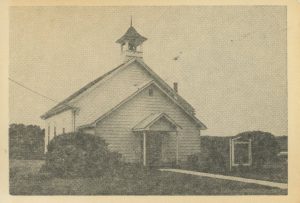God’s Truth is Always Greater than the Church’s Message

I began my 40 year, every-Sunday preaching life in 1977 in the tiny hamlet of Millerstown, Pennsylvania. I served two churches simultaneously. I had written three sermons in seminary. So I pretty much had to learn on my own—far from other ministers, books, and certainly seminary.
Lent was particularly difficult. In addition to the regular Sunday services, I needed to take my turn leading community services in the three Methodist Churches in the county. I felt that I knew what to do with Lent, namely, get ready for Good Friday. In those days I preached about the Seven Last Words, Faces Around the Cross, articles associated with Jesus’ suffering such as the whip or crown of thorns.
By the time the last Good Friday service was over, I was exhausted. And the big day, Easter hadn’t arrived. That was the day that I really needed a fire cracker sermon. I assumed that Easter was the most important Christian holiday. My congregations needed to walk out of church thrilled about resurrection and new life. It was a pretty heavy lift. And I was exhausted.
The Saturday before Easter was tough. I sat with yellow pad and pen in hand. I was running into a hard truth. I didn’t have much to say. I knew that Jesus’ return from the grave had a lot to do with our own prospect for everlasting life. But feeling that assurance and writing it down coherently and convincingly was another matter.

Whatever Happened to Eastertide?
My problems extended beyond Easter Day. There was Eastertide. Those were the days when use of the Common Lectionary—the table of Bible readings for all the Sundays of the year—was just surfacing in Protestant worship. I was aware of the lectionary. My elderly, rural congregants were not. What’s more, that lectionary was relentless in assigning resurrection day Bible passages for five or six Sundays after Easter.
I got a reprieve. In the early Spring, all those small church social activities that couldn’t squeeze onto the schedule during Lent were booked for those post-Easter weekends. Weddings, the Mother-Daughter banquets, graduation, Father’s Day and countless small town galas flooded the calendar.
Hey, what about resurrection? New life? Well, in the real world of congregational life, those Christians had moved on. There was sweet corn to plant for the Autumn Turkey Supper. Summer Camp scholarships for a growing group of elementary age children needed to be distributed. The upshot: the Presbyterians of Millerstown got inoculated with the Easter Gospel for one hour a year with a booster shot at each funeral.
Neglecting Some Important Stuff
I was learning a powerful lesson about what in our faith gets airtime from pulpits and in Sunday School classes. It’s spotty. It’s difficult for it not to be spotty. It was jarring for me to admit to myself that something as important as Jesus’ Resurrection was receiving scant attention. And the one standing behind the pulpit was much to blame.
For those who preach every Sunday year after year, decade after decade, the hours in the minister’s study can be emotionally difficult. They’re also intellectually difficult. It’s tough to come to a mature understanding of what God has given us. Someone wisely said that Christian faith is so glorious that we have to stand on tiptoes—like peering over a fence—to glimpse it. The preacher ought to be on tiptoes week after week. It isn’t the obscure stuff buried away in some slim book in the Old Testament that proves to be the most difficult to understand. It’s the big stuff, like the Sermon on the Mount, or the interlocking ideas in John’s Gospel, or Paul’s intricate argumentation in his letters to his troubled congregations. In turn, much of the Bible is maddeningly difficult to boil down to a crisp, inspiring message that will “preach” on Sunday morning.

It doesn’t take the preacher long to master those tricks, which quietly evade what the message in the Bible is trying to convey. Confused by a complex passage of several verses. No problem, just take a single word, like “love” out of its scriptural context and preach on your personal outlook about love. Most congregations will let you get away with that. Alternatively, tell a snappy or funny story at the sermons start and preach on the story. You can tip your hat at sermon’s end at Bible verses to lend a pious patina to the message. Preach blatantly self-help, pop psychological sermons. We’re all suckers for lists of how to say…get rid of anger or have more zest in life.
Evasion compounds the very problem that I’m lifting up here. To state it succinctly: so much glorious stuff about faith lies buried and neglected. The working faith of churches is generally much less fulsome and majestic than it could be.
On Forgetting
I don’t think I’m exaggerating when I say that the whole Christian movement can lose track of centers of gravity in our faith. The Protestant Reformation was sparked when the monk, Martin Luther, poured over the Bible for personal consolation in his own struggle with guilt and bumped into something that had been neglected–the grace of God. The dominant church of Martin’s day had structured its sacramental system and, regrettably its fund-raising, around an assumption that at crucial points, God’s approval was something to be earned. Grace had gotten lost somewhere along the way. It wasn’t until 1517 that Luther single-handedly pointed out this neglected point and history changed.
We’re talking about how congregations tend to carry on unwittingly neglecting big pieces of Christianity. Recently, Churches have recovered interest in the Kingdom of God. Jesus spends more time talking about the Kingdom of God than any other subject. But like that old forest and trees image, somehow in the preaching and teaching the Kingdom—the idea that a new and beautiful order is breaking into the world—has eluded us. It eluded me and my ministry until the last ten years of my ministry. Shortly after I got excited about the Kingdom I I attempted to lead an adult class on the subject. My church members’ reaction was predictable. Even smart, long-time Presbyterians were irked at the whole idea. They’d ask, “I wish, Doug, you’d just tell us plainly what this Kingdom business is.” The most prominent teaching of Jesus!
The Gospel of Sin Management
The late Dallas Willard, philosopher and spirituality teacher, weighed in on what I’m trying to plant here. He didn’t list what is neglected. He criticized what our congregations over-emphasize. In an early chapter of his Divine Conspiracy, Willard lamented the “gospel of sin management.” Willard explained: Conservative Christians focus on the sins of the individual; liberals, on the sins of society. Too much focus on sin. Willard moved on boldly to say that what gets lost in our single minded focus on sin is discipleship. Following Jesus. Learning from him. Willard moves on in that book to a spacious exposition of Jesus’ Sermon on the Mount, which is an instruction manual for disciples.
If I’m correct about the Church’s tendency to neglect chunks of its own proclamation, there is probably some giant area of God’s grace waiting to be discovered, or re-discovered, right now. It’s probably right under our nose. And, when discovered, that neglected element will launch yet a new reformation.
Knowing this tendency for dimensions of God’s truth to lie buried, we ought to take on a humble and attentive outlook as a spiritual discipline. I’m convinced that each person needs to cultivate his or her own acquaintance with the Scriptures—both testaments. There is just nothing like simply reading the Bible. What I’m suggesting is that we wean ourselves from exclusive reliance on what someone, from a pulpit or otherwise, to tell us what our faith is.

I’ve led small groups of adults who are working to do just that—read with minimal pastoral supervision the Old and New Testaments cover to cover. In groups that do this I hear one reaction over and over. “There’s an amazing amount of stuff in there that doesn’t belong in the Bible.” They’re beginning to get it. The Church’s proclamation never captures the whole picture of its own message in proper balance and tone and detail.
God’s Greatness
In the final analysis, I’m glad that I’ve never been able to get my arms around the full size and beauty and majesty of the good news. It’s not because my arms are too short, but because what God is doing and has done is glorious beyond my capacity to embrace. I bumped into that truth back in those first little country churches as I struggled to give voice to the greatest of all miracles. For me, and I think for all of us, it’s always that Saturday before Easter.

One Reply to “God’s Truth is Always Greater than the Church’s Message”
Thanks Doug- very refreshing and as always- thought provoking! “….the tendency for dimensions of God’s truth to lie buried”- what a profound observation. Reminds me of the “digging” and the findings we searched for in our study in Men’s Bible study each Wednesday! Thanks for the work here!